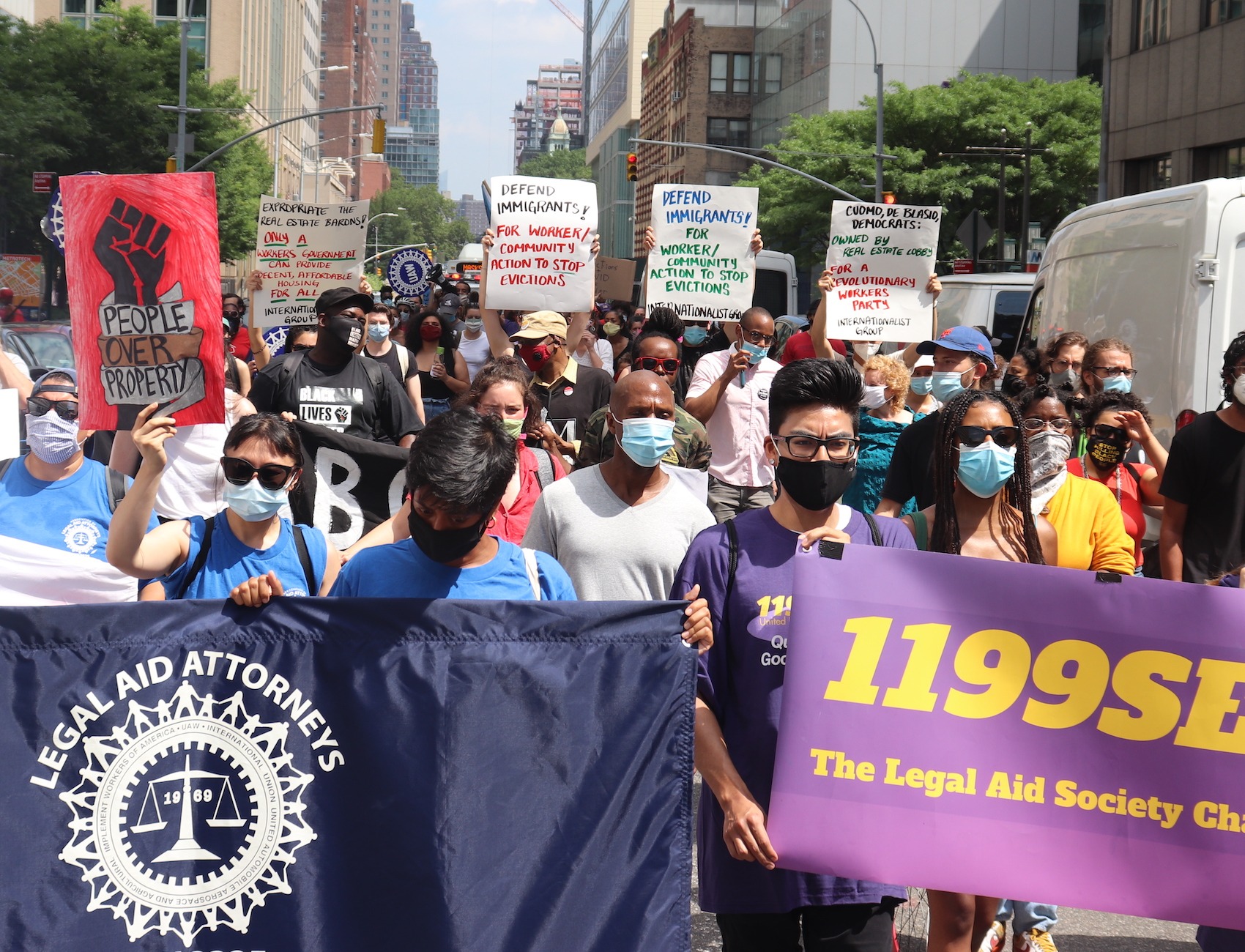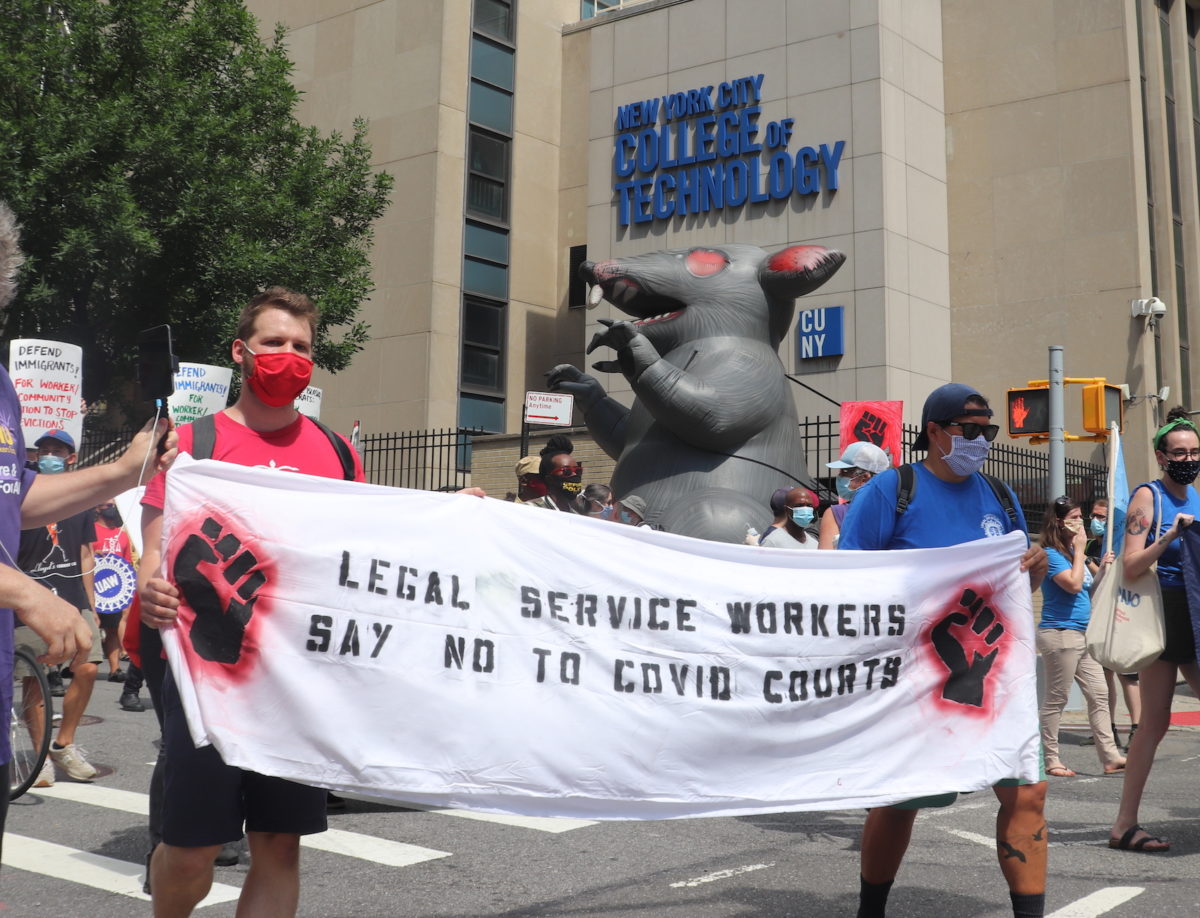New York City Public Defenders Oppose Resuming In-Person Court Appearances
The advocates describe the reopening as unsafe and unnecessary amid the COVID-19 pandemic.

On Monday morning, around 100 protesters, led by lawyers, social workers, legal support staff, and union representatives from public defender agencies, marched from the Kings County Supreme Court’s criminal courthouse in Downtown Brooklyn to its civil courthouse. It was New York City’s 53rd consecutive day of mass demonstrations against policing, racism, and other societal injustices, and legal advocates were taking the fight to their arena.
Two weeks earlier, the New York State Unified Court System announced it would begin lifting COVID-19-related restrictions on court procedures and resume some in-person hearings in New York City courthouses. The court system has begun implementing the plan as of July 15.
Advocates who organized the march say that the reopening plan is a political ploy that puts lives in jeopardy and, because of the pandemic, does not substantially alter the way the courts are functioning. In the protesters’ eyes, the government’s haste reflects a carceral mindset that fails to protect them and their clients from harm.
“Over three dozen of our members contracted COVID-19 because the courts were too slow” to shut down in the beginning of the pandemic, Jared Trujillo, president of the Association of Legal Aid Attorneys, told the crowd before they marched. “We are here to tell the city and tell the [courts] that we care about our clients, we care about Black lives, and it’s time for you to do your damn jobs and care about them, too.”
Since March, executive orders issued by Governor Andrew Cuomo have allowed New York state courts to pause criminal trials and conduct certain pretrial procedures over video, temporarily eliminating the need for in-person appearances that would risk the spread of COVID-19. For months, the state’s criminal legal system has held arraignments, pleas, and evidentiary hearings on the video-conferencing platform Skype, but has otherwise delayed cases indefinitely.
In mid-June, some upstate jurisdictions began holding in-person court appearances for certain criminal procedures. But in New York City—which was, for weeks in the spring, one of the global epicenters of the pandemic—courts continued to conduct all scheduled hearings over video. As the backlog of criminal cases swelled, many who worked in the legal system acknowledged the need to plan for an eventual resumption of in-person hearings. Public defender agencies and the courts each hired health experts, and public defenders and court representatives began touring city courthouses in late June in order to come up with safety guidelines for the eventual reopening. According to many public defenders, however, there was an understanding that the city still had a lot of work to do to ensure safety in the courts, and that most in-person appearances wouldn’t happen for quite some time.
Then, during the week of July 6, the New York State Unified Court System announced that courts would begin resuming in-person appearances the following week for felony cases where the person is not currently in jail.
For public defenders, the plan was sudden and unexpected. They scrambled, and on the eve of the first in-person appearances, six city public defender agencies jointly filed a lawsuit to ask a federal judge to halt it. The suit cites the Americans With Disabilities Act, charging that the plan was “an abrupt interruption of collaborative planning for a safe reopening of the New York City criminal courts,” and that the resumption of in-person appearances would place defendants and workers, especially those with underlying health concerns, at grave risk.
“The completely unnecessary rush to throw hundreds of people back into the courts on almost no notice is nothing short of traumatic and irresponsible,” the lawsuit said.
In filing the lawsuit, New York City public defenders joined other legal workers across the country in pushing back against court reopenings. An assistant district attorney in Allegheny County, Pennsylvania, where several attorneys and court workers have tested positive for COVID-19 and at least two have landed in intensive care, has filed a complaint with the federal Occupational Safety and Health Administration. In Louisiana, the Rapides Parish Public Defender’s Office told a judge earlier this month that its lawyers would “no longer personally appear in court” until the courthouse came up with safer COVID-19 mitigation plans. And the National Association of Immigration Judges has been fighting against the reopening of the country’s immigration courts.
Resuming in-person court appearances won’t accomplish much, New York City public defenders argue. Critical deadlines for criminal cases remain suspended. And while the logistics around virtual court at times can be frustrating, the resumption of non-essential, in-person appearances at this stage does little more than endanger communities, said Ann Mathews, managing director of the criminal defense practice at the Bronx Defenders. “It’s a way of providing the appearance of process while achieving nothing that could not be accomplished virtually, all at such great risk to so many people involved in different aspects of the system and in the community.”
The questionable necessity of the plan has been punctuated by the fact that, since in-person proceedings resumed last week, some people scheduled to appear in court have been excused by the judge because they expressed coronavirus-related health concerns; their hearings were rescheduled, according to Lucian Chalfen, director of public information for the state courts. In fact, in the first three days of resumed in-person appearances last week, most defendants didn’t show up for court; some were excused, while others couldn’t be contacted in time or simply didn’t show.
Lisa Schreibersdorf, executive director of Brooklyn Defender Services, says that this is further evidence that the resumption of in-person appearances has been rushed. Public defenders have been given minimal notice of their court dates, she said, and “it’s highly doubtful” that defendants are being informed of their appearances with enough notice to make arrangements to make it into court.
Many public defenders suspect that, in announcing their plans to resume in-person appearances in New York City, court officials were motivated more by politics than by public health or the procedural needs of the criminal legal system. The same week of the announcement, Mayor Bill de Blasio, during one of his regular public addresses, partially blamed a recent spike in shootings in the city on the limited functionings of the court system, and insinuated that the NYPD was pushing for criminal courts to fully reopen.
“A functioning criminal justice system makes sure there are consequences,” de Blasio said. “If someone does something wrong and violent, they’re arrested, and then there is a trial and there’s an outcome. All of that has been unglued. Now, we’re gonna get it back. [NYPD Commissioner Dermot Shea] met with the chief judge and the DAs, and I do think in the coming weeks you’re going to see the court system come back to life. You’re gonna see the prosecutions intensify.”

Public defenders were quick to counter, explaining that de Blasio’s reasoning had no evidential backing. In addition to pointing out that most felony arrests—around 95 percent—never make it to trial, they argued that it was ridiculous to think that inner workings of the court system would have anything to do with someone’s decision to commit an act of gun violence. The mayor’s assertion echoed statements made by Commissioner Shea, who, the week before, had claimed that the rise in shootings was attributable to recent bail reform measures and coronavirus-related jail and prison depopulation—an assertion debunked by his own department’s data.
De Blasio was “peddling NYPD tropes,” said Trujillo of the Association of Legal Aid Attorneys. “And suddenly, [the courts] just abandon all their plans to have this slow, intentional, meaningful reopening.”
For Trujillo and many other public defenders in New York City, forcing defendants into criminal courthouses during COVID-19 is an echo of the city’s push to reopen housing courts—which has also been met with frustration and significant protest—and what they see as a rush to subject poor, Black, and Latinx New Yorkers to the legal consequences of the pandemic, with little regard for the public health risk. “I think the mayor said it best himself, it’s a tale of two cities,” Trujillo said. “Gyms and indoor seating for restaurants and everything else, they are not reopening, but eviction proceedings are okay.”
Asked whether the mayor and police were involved in the plans to resume in-person court appearances, Chalfen of the state courts said that “the New York City mayor and police department have nothing to do with the running of the New York State Court System.” Chalfen recently accused de Blasio of “shifting the blame” to the court system for the uptick in crime, saying the mayor “continues to refuse to take any responsibility for his actions.”
The public defenders’ lawsuit to halt in-person appearances is ongoing. Last week, the federal judge blocked an emergency request from the defenders for a temporary restraining order.
With what courts are currently able to accomplish, “it doesn’t make any sense to create these unsafe conditions,” said Schreibersdorf of Brooklyn Defender Services. “Are these [in-person appearances] really essential? Are they necessary? Do you need them?” So far, in public defenders’ eyes, the answer to those questions is a resounding no.
